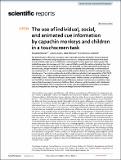The use of individual, social, and animated cue information by capuchin monkeys and children in a touchscreen task
Date
13/01/2021Metadata
Show full item recordAbstract
The distinctiveness of human cumulative culture raises the question of whether humans respond differently to information originating from social sources, compared with information from other sources. Further, does any such differential responding set humans apart from other species? We studied how capuchin monkeys and 2- to 5-year-old children used information originating from their own actions, those of a human demonstrator, or an animated cue. This information, presented via a touchscreen, always revealed in the first trial (T1) the reward value (rewarded or unrewarded) of one stimulus from a 2- or 3-item array, and could be used in a follow-up trial (T2) involving the same stimulus array. Two monkeys achieved a level of proficiency indicating their appreciation of the T1–T2 relationship, i.e., reliably repeating rewarded (“win”) selections and actively avoiding repetition of unrewarded (“lose”) selections well above chance levels. Neither the two task-proficient monkeys nor the children showed overall performance differences between the three source conditions. Non-task-proficient monkeys, by contrast, did show effects of source, performing best with individually-acquired information. The overall pattern of results hints at an alternative perspective on evidence typically interpreted as showing a human advantage for social information use.
Citation
Renner , E , Kean , D , Atkinson , M & Caldwell , C A 2021 , ' The use of individual, social, and animated cue information by capuchin monkeys and children in a touchscreen task ' , Scientific Reports , vol. 11 , 1043 . https://doi.org/10.1038/s41598-020-80221-4
Publication
Scientific Reports
Status
Peer reviewed
ISSN
2045-2322Type
Journal article
Collections
Items in the St Andrews Research Repository are protected by copyright, with all rights reserved, unless otherwise indicated.

